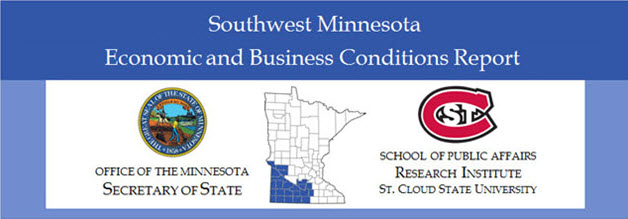Publication Title
Southwest Minnesota Economic and Business Conditions Report
Document Type
Research Study
Publication Date
6-13-2019
Financial Year
2018
Abstract
The St. Cloud State University Southwest Minnesota Index of Leading Economic Indicators (LEI) continued to bounce around as the fourth quarter LEI registered an 8.26 point loss after recording a strong positive value in the third quarter of the year. This quarter’s negative reading is largely attributed to higher initial jobless claims in the region as well as weaker new filings of incorporation and LLC in the Southwest Minnesota planning area. An increase in the number of residential building permits in the Mankato/North Mankato metropolitan statistical area and an improvement in the Rural Mainstreet Index, a statistic that is used to measure the economic outlook for rural Minnesota, each contributed favorably to the region’s leading index. The SCSU Southwest Minnesota LEI is now 2.7 percent above its level of one year ago.
There were 645 new business filings with the Office of the Minnesota Secretary of State in Southwest Minnesota in the fourth quarter of 2018 — representing 4 percent more new filings than one year ago. There were 40 new regional business incorporation filings in the fourth quarter, an 8.1 percent increase from last year’s fourth quarter. New LLC filings in Southwest Minnesota rose 2.8 percent (to a value of 404) from one year earlier and new assumed name filings rose to 159—a 1.3 percent year-over-year increase. There were 42 new filings for Southwest Minnesota non-profit in the fourth quarter—nine more filings than one year ago.
Fifty-seven percent of new business filers in the Southwest Minnesota planning area completed the voluntary Minnesota Business Snapshot (MBS) survey in the fourth quarter. Results of this voluntary survey indicate that 4.7 percent of new filers come from communities of color. Approximately 8.2 percent of new business filings are from veterans. About 1.9 percent of new filers come from the disability community and 8.5 percent of new filings were made by the immigrant community. Nearly 40 percent of new business filings in Southwest Minnesota in the fourth quarter were initiated by women. MBS results also show that most new business filers in Southwest Minnesota have between 0 and $10,000 in annual gross revenues (although 46 new filers have revenues in excess of $50,000). The most popular industries for new businesses in Southwest Minnesota are retail trade, construction, real estate/rental/leasing, agriculture/forestry/fishing/ hunting, professional/scientific/technical and other services. Employment levels at most new firms are between 0 and 5 workers, and 45.7 percent of those starting a new business consider this a part-time activity.
Employment of Southwest Minnesota residents increased by 0.2 percent over the year ending December 2018. The regional unemployment rate was 3.4 percent in December, a small decrease from a 3.5 percent reading in December 2017. Initial claims for unemployment insurance were 1.5 percent lower than year-ago levels in December. Average weekly wages in Southwest Minnesota increased by 3.5 percent to $799. The regional labor force rose by 0.2 percent over the year ending December 2018. The number of bankruptcies in the region declined slightly in the most recent period.
Economic performance in the Mankato/North Mankato Metropolitan Statistical Area (MSA)— the largest market in Southwest Minnesota—was mixed in the most recent quarter. Employment rose, average hourly earnings increased, the labor force expanded, initial jobless claims were lower, and the value of Mankato area residential building permits increased. However, new business filings were lower, the relative cost of living rose, average weekly work hours fell, and the area’s unemployment rate was unchanged.
Recommended Citation
Banaian, King and MacDonald, Richard A., "Southwest Minnesota Economic and Business Conditions Report Fourth Quarter 2018" (2019). Southwest Minnesota Economic and Business Conditions Report. 19.
https://repository.stcloudstate.edu/qebcr_sw_mn/19




